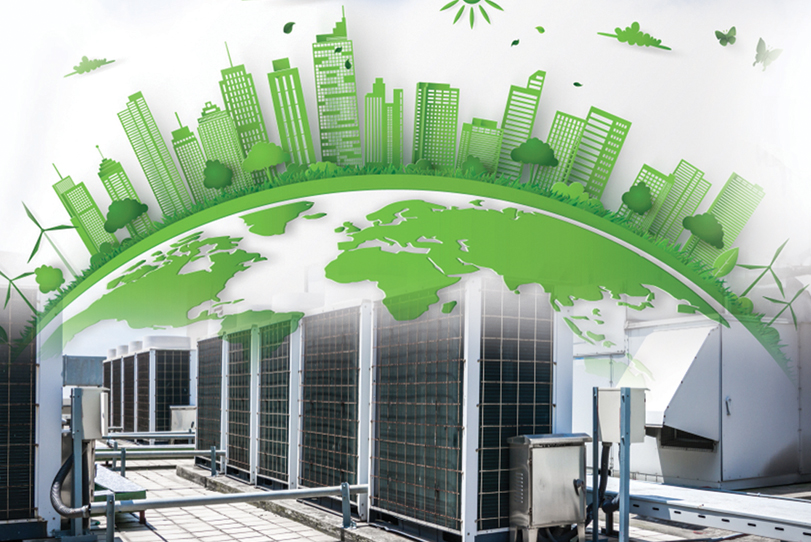When you think about the elements that make a building eco-friendly, HVAC systems play a key role. Heating, ventilation, and air conditioning systems are the unseen engines that control comfort and air quality in our homes and offices. But beyond comfort, these systems can also contribute to sustainability. Let’s explore how modern HVAC innovations are shaping greener buildings for a better future.
Energy-Efficient HVAC Systems Reduce Carbon Footprints
Modern HVAC systems are no longer just about heating and cooling. They’re designed with energy efficiency at their core. By using advanced technologies like variable speed compressors and smart thermostats, these systems adjust power usage to meet real-time needs, cutting unnecessary energy consumption.
An energy-efficient HVAC service can reduce your building’s carbon footprint by lowering reliance on fossil-fuel-based energy. It’s estimated that upgrading to such systems can cut greenhouse gas emissions by as much as 40%. In addition to being eco-friendly, these systems also save on utility bills—making them a win-win for both the environment and your wallet.
Integrating Renewable Energy Sources with Modern HVAC Systems
The synergy between renewable energy and HVAC systems is driving sustainable building solutions. Solar panels and geothermal energy sources are increasingly being paired with HVAC installations to create hybrid systems. These setups draw power from the sun or underground heat, reducing dependence on conventional electricity grids.
For example, a geothermal heat pump uses the stable temperature beneath the earth’s surface to regulate indoor temperatures. Pairing such systems with solar-powered fans or water heaters creates an HVAC installation that’s not only efficient but largely self-sustaining. With the growing accessibility of renewable technologies, integrating them into HVAC designs is easier than ever.
A Guide to Choosing Eco-Friendly HVAC Materials and Refrigerants
Sustainable HVAC systems go beyond energy efficiency—they also prioritize the materials and refrigerants used. Traditional refrigerants, like R-22, are being phased out because of their harmful impact on the ozone layer. Today’s systems use eco-friendlier options such as R-410A and R-32, which have lower global warming potential (GWP).
Additionally, eco-conscious builders are leaning towards HVAC units made from recyclable or sustainably sourced materials. Copper and aluminum, often used in coils, are preferred for their durability and recyclability. When selecting a system for your home or office, consulting a trusted provider about eco-friendly options can make a big difference in supporting green initiatives.
Economic Benefits of Sustainable HVAC in Commercial Buildings
For commercial buildings, sustainable HVAC systems aren’t just about environmental benefits—they offer significant economic advantages too. High-efficiency systems lead to lower operating costs by consuming less energy. Over time, the savings on electricity bills can offset the initial investment in these advanced systems.
Moreover, many jurisdictions offer tax incentives, rebates, or subsidies for upgrading to energy-efficient commercial HVAC service systems. These financial perks can make eco-friendly choices even more attractive to businesses. Not to mention, sustainability certifications like LEED (Leadership in Energy and Environmental Design) can enhance property value and appeal to eco-conscious tenants.
Conclusion
From reducing energy consumption to improving indoor air quality with eco-friendly materials, HVAC systems are an integral part of creating green and sustainable buildings. Whether you’re considering an upgrade for your home or looking to optimize a commercial space, choosing the right HVAC service provider can make all the difference.
If you’re ready to make the switch to a greener HVAC system, the team at AirDuctLV Heating & Cooling is here to help. With expert solutions in HVAC installation and maintenance, they’re committed to helping you achieve comfort without compromising sustainability.


Related Stories
Stay Cool in the Desert: Expert HVAC Repair in Las Vegas with Air Duct LV
Living in Las Vegas means one thing for sure — you can’t afford to have
Aug
Why AC Leaks Happen—and How We Fix Them Fast
Few things are more frustrating than noticing water pooling near your air conditioner or finding
Jul
Aging Ductwork in Vegas Homes: Risks & When to Replace Instead of Clean
You probably don’t think much about your air ducts—until your home starts feeling less comfortable,
Jul
Duct Sealing Explained: Why It Matters Post-Cleaning
After getting your air ducts cleaned, you might think the job’s done. But sealing them
Jul